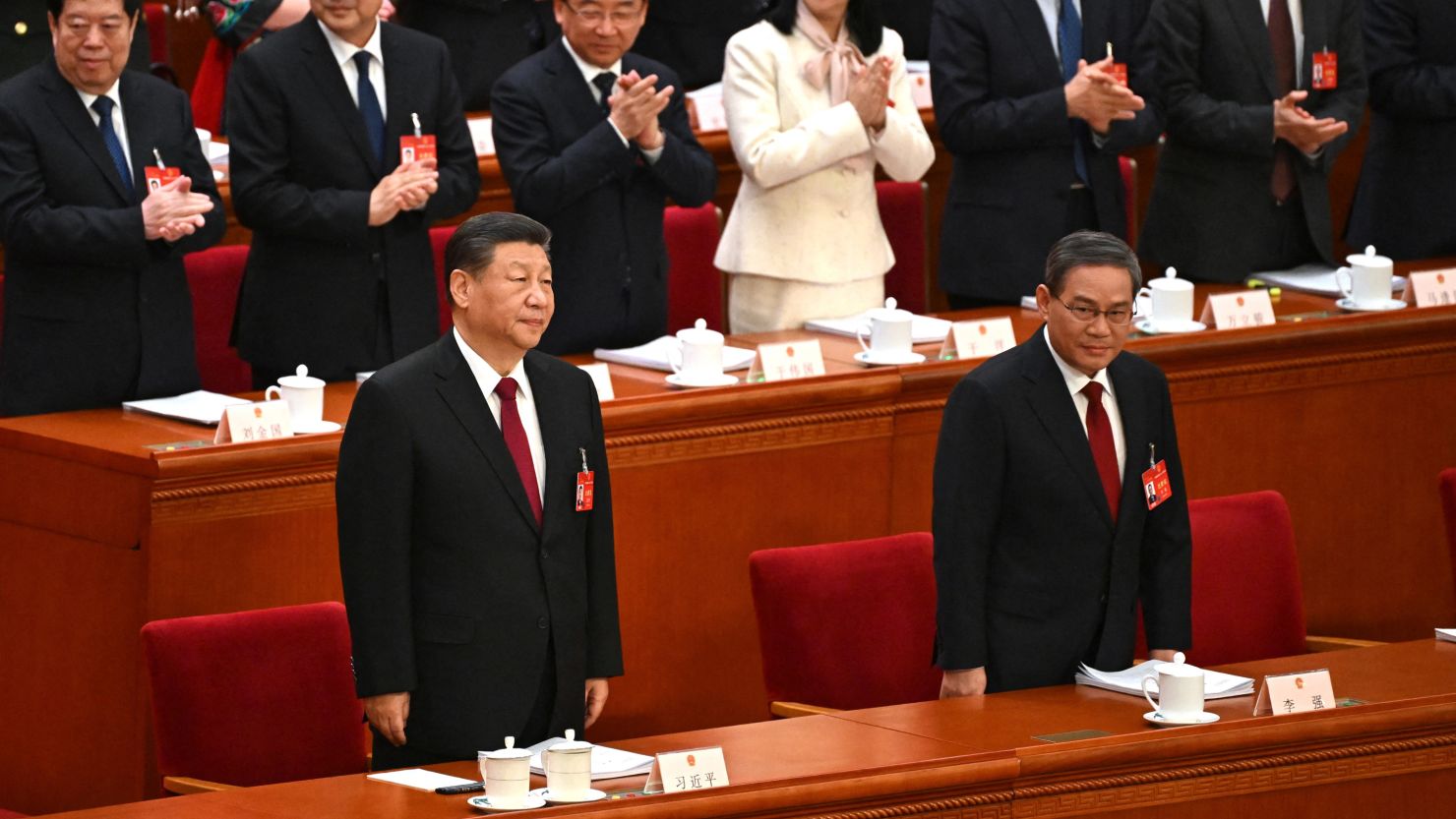Chinese President Xi Jinping paid a state visit to Russia from Wednesday to Friday (June 5 to 7). During this period, China and Russia signed two joint statements, one on China-Russian relations and one on the global situation. It is worth noting that, compared with previous statements, the name of the statement concerning relations between the two countries has added the words “new era”, which represent the new era of China-Russian relations and the official propaganda of China. The mainstream tone of this visit to Xi Jinping.
In addition to the “new era” in the “China-Russian Joint Statement on the Comprehensive Strategic Cooperation Partnership for the Development of a New Era”, the China-Russian Joint Statement on Strengthening Contemporary Global Strategic Stability Concerning the Global Situation The name of “” is also more “contemporary” than the 2016 statement. On the content side, the statement directly criticized the United States on issues such as the Treaty on the Limitation of Anti-Ballistic Missile Systems, the “Guidelines on the Intermediate Guide” and the “Comprehensive Nuclear Test Ban Treaty”. On the Iranian nuclear issue, “the US side cannot impose unilateral sanctions on Iran. Accepted, very unusual. In the past, most statements by China and Russia on the global situation have announced their positions. When talking about specific issues, most of them refer to some countries or some countries.
China-Russian relations have not focused on bilateral cooperation since the beginning. The vision of China and Russia has focused on the world from the beginning. Therefore, China-Russian relations have entered a new era, and in fact, they are linked to the China-Russian statement on the global situation.
The new era, on the one hand, reflects the nature of the relationship between the two sides entering a new era. China has a dominant position in bilateral relations, Russia’s dependence on China has deepened, and on the other hand, it has emphasized the position and role of China-Russian relations in the world. era. The three words “new era” also have a strong Chinese color.
The balance has been tilted
“Xi Jinping’s New Era of Socialism with Chinese Characteristics” was written into the Chinese Communist Party Constitution and the Chinese Constitution in 2017 and 2018. The “new era” is itself a manifestation of China’s proposition. Russia agreed to add these three words to the two countries. The name of the relationship implies its recognition of the Chinese proposal.
The China-Russian joint statement said that one of the goals and directions of the China-Russia new era comprehensive strategic partnership of cooperation is to promote the building of a new type of international relations of mutual respect, fairness, justice, cooperation and win-win, and promote the construction of a “community of human destiny.”
Building a “community of human destiny” is itself a Chinese proposition. In the report of the 19th National Congress of the Communist Party of China, Xi Jinping clearly stated: “The diplomacy of a big country with Chinese characteristics should promote the construction of a new type of international relations and promote the building of a community of human destiny.” The “community of human destiny” has become China’s international outlook, world view, and global program in recent years. Sexual expression.
Not only is the name of the joint statement written in the “new era”, but the content is also written to build a “community of human destiny”, indicating that the balance of China-Russian relations has been tilted toward China.
China’s rise is changing the global geopolitical landscape, and the Western world is undergoing deconstruction. At the same time, China’s relations with other parties are undergoing complex changes. Among the many changes, the changes in China-Russian strategic cooperative relations are actually changes in the dominant position of China-Russian relations, reflecting that China has more say. The Chinese discourse system covers both China-Russian bilateral documents, but it is only the appearance of this trend.
China is not only the world’s second-largest economy. Just as Xi Jinping interviewed the media before his visit to Russia, China said that China is fully qualified, capable and confident in responding to various risk challenges. Today’s China is no longer China’s strategic cooperation with Russia. Russia must adapt to China’s current reality.
From defense to attack
China’s independence in global politics has gradually increased, and China’s economic prospects are limitless. Russia’s main task in the past was to guard against the strategic threat of the United States, and strategic cooperation with China was only an aid. Today, for Russia, the most important task is to study how to cooperate with China to develop and prevent the threat of the United States as a side effect.
China must also adapt to the major contradictions in the world that it has been regarded as the most important opponent by the United States. For China, the increase in strength will increase the pressure simultaneously. Russia, both past and present, is the object of China’s need for strategic collaboration. This kind of collaboration is a collaboration based on sufficient strength in China, and it is a friend-like collaboration rather than a dependent collaboration.
When Xi Jinping met with Russian President Vladimir Putin last Thursday (June 5), he said that he is in a world of unprecedented changes in the world. China is willing to work with Russia to contribute more “Chinese-Russian programs” in international affairs.
On the following day (June 6), Xi Jinping met again with Putin in St. Petersburg, saying that under the current situation, the two sides should deepen strategic cooperation, not only to safeguard the interests of China and
Russia, but also to defend basic international norms and international morality. To maintain world peace, security and stability, and express China’s demands for strengthening China-Russia strategic cooperation in the global situation. In the past, the background of China-Russia strategic cooperation was a combination of two strong and strong. Today, China and Russia are facing a strong world, the United States has become weak, and the Western world led by the United States is deconstructing.
In the past, although China and Russia were the factors that promoted the changes in the world situation, they occupied a limited amount. The main purpose of strategic cooperation between the two countries was to defend themselves. Today, China and Russia are still the factors that drive the world’s change, but the weight is further increased. The situation changes more than self-defense and becomes the main purpose of strategic cooperation.
International Quantification and Variables
From the perspective of comprehensive strength, national will, strategic vision and so on, China, the United States and Russia are the core players of the entire world. The United States hopes to guard the traditional international structure and strive to consolidate its single-level hegemonic status. China hopes to improve the original international order and has different opinions on the United States from many issues. It is urgent to shake off the pressure from the United States and establish a new political and economic order.
In the unipolar world of the United States, Russia may face sovereign danger at any time, but in a multi-polar world, Russia’s strategic security risks will gradually diminish and have the energy to turn to economic construction. Under the change of a century, Russia still has the desire to further change the original order. It hopes to continue strategic cooperation with China and consolidate the trend of multi-polarization.
European countries are important factors and variables that influence the future pattern. They are both beneficiaries of the original international order and face the challenges of the United States under the original international order. They have certain aspirations for promoting the development of the international order toward multi-polarization and have certain independence and autonomy, but this independence is passive. As long as the United States does not further suppress Europe or encroach on the interests of Europe, Europe lacks the impetus to promote a change in the international order.
Japan is the third largest economy in the world and an ally of the United States. It lacks independence in diplomacy and politics. Although Japan is not willing to accept the post-war order arranged by the United States and the demands of changes in the post-war international order, Japan cannot bear the consequences of publicly challenging the United States, nor is it willing to openly friction with the United States. Japan’s refusal to return to the Trump administration on issues such as trade negotiations is the result of a review of the global trade war. That is to say, although Japan is an important variable in the international situation, it is also an action group that changes according to changes in the international situation and will not take the initiative to provoke changes in the international order.
India’s economic aggregate has already squeezed into the top five in the world. In recent years, India hopes to enter the country, indicating that India, as an emerging power, has the desire to change its original order. But on the economic front, India’s ability to resist risks and resist pressure is not as good as China’s, and it is more necessary to buy weapons from the United States and Russia in the military. At this stage, India hopes that further development, further accumulation of strength, and promotion of changes in the international order may not be the main line of Indian diplomacy.
The future international pattern is actually centered on the China-US-Russian game. The important political bodies such as Europe, Japan, and India mainly influence the game in the periphery. There is a certain correlation between the two and mutual influence.
An important aspect of China-Russian strategic cooperation entering a new era is that the background of the game between China and Russia and the United States has changed, and more and more forces can be united and won.
The china-us struggle becomes the mainline
The change of China and Russia to the traditional international order has entered a new stage. The main task of China-Russian strategic cooperation in the new era is to consolidate the multi-polarization pattern and provide the impetus for the construction of a multi-polar world. The struggle against the US’s resistance will be dominant, and it will take time for the United States to accept the new pattern and find a suitable place under the new pattern.
The new era of China-Russian relations is also due to its changes in the triangular relationship between China, the United States and Russia. China-US-Russia relations have not been a reciprocal trilateral relationship. In the China-US-Soviet triangle relationship in the 1950s, the relationship between the United States and the Soviet Union was the long side of the triangle. The China-US and China-Soviet relations were two very short sides. This was because China’s global power and the United States and the Soviet Union were Not equal. After the end of the Cold War, the three-sided relationship between China, the United States and Russia, the United States and Russia are the main axes, and China is the auxiliary. The depth and breadth of the US-Russia side is greater than that of China and Russia. The China-Russian side is much larger than China and the United States.
Today’s China-US-Russia trilateral relations, China and the United States are much larger than China and Russia. China and Russia are similar to the United States and Russia. In other words, the China-US-Russian game has shifted from the US-Russian struggle to the China-US struggle. In the past, China has provided more assistance. Now Russia is providing more assistance to China.
The above excerpt from the 166th issue of “Hong Kong 01” weekly report (June 10, 2019) “The change of the unbalanced triangle relationship between China and Russia under the centuries of change”.











